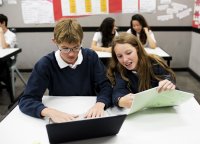A Strategy for Effective Student Collaboration
A well-known protocol can help student teams reflect intentionally on their work—a necessity for improvement and learning.
Your content has been saved!
Go to My Saved Content.Working in teams is difficult, but most teachers recognize that building the capacity to collaborate with others is essential. The most pressing problems facing us, our communities, and our society are complex and multifaceted—they evade simple solutions and tend to require a breadth of knowledge, insight, and creativity that can only be accessed when people come together.
But even educators who espouse the virtues of collaboration can struggle mightily to support students in doing it well.
Teams Can Be Stubborn
Unlike individuals, who have the potential to be agile and learn quickly, teams can repeat the same mistake over and over again, to the frustration of every single member of the team.
That’s because teams don’t learn in the same way that individuals do.
When you as an individual touch a hot stove, you’re far less likely to touch it again. Most of us process the painful experience and choose to change our behavior rather quickly. However, it’s quite easy for a group to touch the same proverbial hot stove again and again—within a team, there is no single head within which a painful (or successful) experience can be processed and where reflection and adaptation can take place.
For many educators, our instinct is to rush in and save the day when we see teams struggle. We take on the responsibility for defining and solving the problem on behalf of the team. Students may welcome this intervention, as it can offer momentary relief from the struggle and frustration that their team may be experiencing.
However, such interventions can keep the students from developing their own capacity to learn from their team’s experiences and successfully address future problems. In other words, the problem at hand might be solved, but the group isn’t getting any smarter. Chances are, the team will once again touch the same hot stove that caused the trouble in the first place.
A Powerful Protocol for Group Learning
To address the problem of group learning, a team must develop the ability to reflect on itself. Without intentional reflection, members of a team are unlikely to develop a collective sense of what is working and what is not, making improvement unlikely.
What would this reflection look like? Consider the rather simple, yet powerful, protocol developed by the U.S. military and used by many corporations—the after-action review (AAR). The AAR is a structured process that allows a team to learn from its own experiences. Part of it involves a team asking and answering four basic questions: What did we intend to do? What were our actual results? What explains our results? Moving forward, what do we want to sustain, and what do we want to change?
In my experience as a high school math teacher, it was common to see student teams repeat the same mistakes over and over again. Whether it was due to a lack of communication, imprecise language, failure to draw on the insights of all team members, or deficient or unclear team processes, I would constantly see teams grow frustrated and fall into the typical group work traps. These traps can have severely negative impacts on a team’s ability to grapple with complex content, explore meaningful questions, and learn deeply. In fact, these traps are the very reason why so many educators avoid group work in the first place.
Walking my students through questions similar to the AAR proved remarkably powerful in helping them overcome these traps. Here’s an illustrative example that occurred on the fourth day of a five-day design project, when one of my student teams experienced a moment of panic. The students were well through their design phase and had started constructing their design. While their original design was creative and mathematically sound, they ended up misinterpreting their own diagram and plans, which led them down an incorrect path.
When I approached them, they were eager for me to solve the problem. However, I knew less than they did about the nature of their problem, let alone how to address it. Rather than swoop in to fix their problem, I helped them reflect on what had happened.
I asked each student to describe what had gone wrong while the others listened. Each of the students had a slightly different perspective on the problem. They talked about challenges with their team’s communication, faulty mathematical assumptions they had made, and their inattention to the mathematics within their design and plan.
Next, I asked them what they intended to do moving forward. They were able to articulate thoughtful changes to the way their group would operate to address their challenges. These changes included more regular and structured communication between team members and frequent referrals to their team’s design. In the end, the group experienced a tremendous rebound and ultimately had a successful project and learning experience.
Whether a teacher helps students reflect on their team’s experiences, or whether teams learn to use their own protocols for doing so, the important idea is that teams only learn through intentional and deliberate reflection. Without the time, space, and discipline to reflect on their experiences, teams likely won’t develop a collective and explicit understanding about what they’re doing that’s working and what they need to change.
